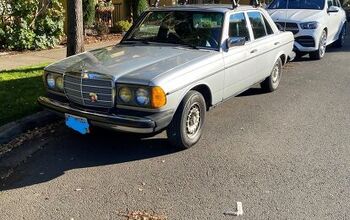Survey Says: Americans Want Big Range From EVs

And in other news, the sky is blue and water is wet. America is a vast landscape, after all. Eggheads at the professional firm Deloitte have released their 2022 Global Automotive Consumer Study, one which polls respondents from countries around the globe about forward-looking topics in automotive.
One key takeaway? It seems Americans want more EV range than anyone else in the world. A lot more.
Generally speaking, consumers in the States expect the driving range of a fully charged BEV to be north of 500 miles, while people in places like China and Japan are content with a range of half that amount. The quick-minded in our audience will point to the massive amount of land which comprises America, meaning our driving distances are often much longer on average than they are for folks living in countries on the Pacific Rim.
Specifically, the question – phrased as “How much driving range would a fully charged all-battery electric vehicle need to have in order for you to consider acquiring one? – revealed that respondents on this side of the pond want 518 miles of range. Koreans and Germans answered with an average of 397 and 383, respectively. India, Japan, and China replied with sums well south of even those numbers: 277, 260, and 258 miles.
Related to this finding, a full 20 percent of American respondents indicated driving range is their greatest concern regarding all battery-powered electric vehicles. Lack of charging infrastructure was the next biggest hurdle cited (14 percent), followed by price premium at 13 percent. The ability to charge up on the run was a big concern for all regions, with more than one-quarter of respondents in Asian countries naming that issue as their biggest EV apprehension.
Other interesting results to parse from this survey? Americans seem to abhor the idea of a vehicle subscription service, at least compared to drivers in China and India. Nearly 4 out of 5 respondents in those countries cotton to the idea, compared to less than a third of those surveyed in America. In a stat that will surprise no one, personal vehicles are far and away the preferred mode of transportation in this country, compared to about 50 percent in most of Asia and a surprisingly low 67 percent in Germany.
In terms of buying their next car – EV or not – this survey revealed the vast majority of customers (in most countries) plan to hit up a bricks-and-mortar dealer when they need new wheels. However, of those who want to buy a rig online (roughly one-in-five across the board), it’s Americans who seem to most dislike setting foot inside a dealership. Less than half of those people want to acquire their next vehicle from a dealer via a virtual process, and America led the way in citing “Desire to avoid going to a dealer” as the main impetus for buying a car online.
Respondent demographics in terms of age were generally evenly split into thirds (18 – 34, 35 – 54, 55+) in all regions, with about 1,000 people surveyed in each of the 25 countries. Pollsters at Deloitte aimed for a roughly 50/50 gender split when selecting people to whom they asked these questions.
[Image: Ford]

Matthew buys, sells, fixes, & races cars. As a human index of auto & auction knowledge, he is fond of making money and offering loud opinions.
More by Matthew Guy
Latest Car Reviews
Read moreLatest Product Reviews
Read moreRecent Comments
- V8-1 Go hybrid and wait for Toyota to finish its hydrogen engine and generator/separator.
- Poltergeist I expect this will go over about as well as the CR-Z did 15 years ago.
- Michael S6 Welcome redesign from painfully ugly to I may learn to live with this. Too bad that we don't have a front license plate in Michigan.
- Kjhkjlhkjhkljh kljhjkhjklhkjh A prelude is a bad idea. There is already Acura with all the weird sport trims. This will not make back it's R&D money.
- Analoggrotto I don't see a red car here, how blazing stupid are you people?


































Comments
Join the conversation
Personally, I feel like it would help for EVs need to be thought of range similar to a cell phone. Simply change the data we use: from charge time and miles till empty To Charge time and Hours until device is empty. Regardless of miles driven. Forget about that hell without oil changes does mileage matter?or Tire maintenance? Yeah right Ha. To me that is a major factor not included in discussion like that story posted here about winter nightmares. How long can the EV idle? How much Do miles driven affect idle time? Once this is understood many Americans might have a better idea to get them or not. It could look Something like this: NEW 2023 EV SUV 1-4 hour charge/36 Hours. All miles aren't the same so if manufacturers could formulate a new way to show us range without miles driven it might work. Might doom them.
If the goal is reduce emissions and save resources all cars should be much smaller, much lighter, much slower. Won’t happen without regulation.